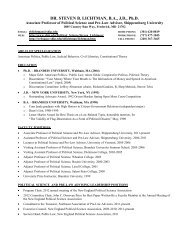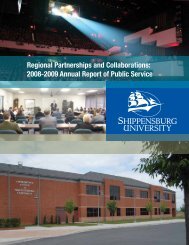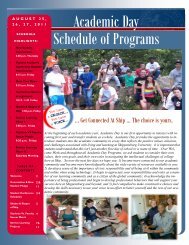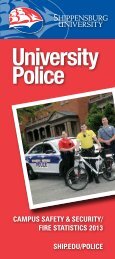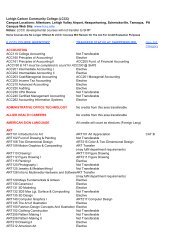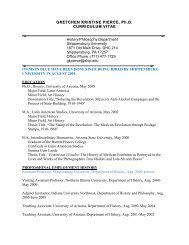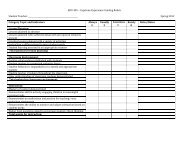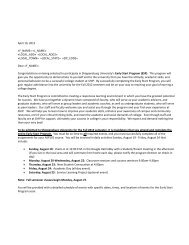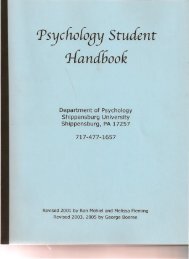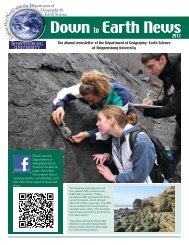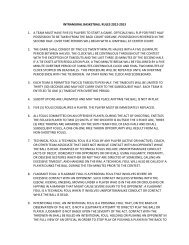Complete Issue - Shippensburg University
Complete Issue - Shippensburg University
Complete Issue - Shippensburg University
- No tags were found...
Create successful ePaper yourself
Turn your PDF publications into a flip-book with our unique Google optimized e-Paper software.
Charles Fishman: Message in a Bottle 9There is one more item in bottled water’senvironmental ledger: the bottles themselves. Thebig spring water companies tend to make their ownbottles in their plants, just moments before they arefilled with water—12, 19, 30 grams of molded plasticeach. Americans went through about 50 billion plasticwater bottles last year, 167 for each person. Durable,lightweight containers manufactured just to bediscarded. Water bottles are made of totally recyclablepolyethylene terephthalate (PET) plastic, so we shareresponsibility for their impact: Our recycling rate forPET is only 23 percent, which means we pitch intolandfills 38 billion water bottles a year—more than $1billion worth of plastic.Some of the water companies are acutely aware thatevery business, every product, every activity is underenvironmental scrutiny like never before. Nestlé Watershas just redesigned its half-liter bottle, the most popularsize among the eighteen billion bottles the companywill mold this year, to use less plastic. The lighter bottleand cap require 15 grams of plastic instead of 19 grams,a reduction of 20 percent. The bottle feels flimsy—ituses half the plastic of Fiji Water’s half-liter bottle—and CEO Jeffery says that crushable feeling should bethe new standard for bottled-water cachet.“As we’ve rolled out the lightweight bottle, peoplehave said, ‘Well, that feels cheap,’” says Jeffery. “Andthat’s good. If it feels solid like a Gatorade bottle or aFiji bottle, that’s not so good.” Of course, lighter bottlesare also cheaper for Nestlé to produce and ship. Goodenvironmentalism equals good business.John Mackey is the CEO and cofounder of WholeFoods Market, the national organic-and-naturalgrocery chain. No one thinks about the environmentaland social impacts and the larger context of food moreincisively than Mackey—so he’s a good person to helpframe the ethical questions around bottled water.Mackey and his wife have a water filter at home,and don’t typically drink bottled water there. “If I goto a movie,” he says, “I’ll smuggle in a bottle of filteredwater from home. I don’t want to buy a Coke there, andwhy buy another bottle of water—$3 for 16 ounces?”But he does drink bottled water at work: Whole Foods’house brand, 365 Water.“You can compare bottled water to tap water andreach one set of conclusions,” says Mackey, referringboth to environmental and social ramifications. “Butif you compare it with other packaged beverages, youreach another set of conclusions.“It’s unfair to say bottled water is causing extraplastic in landfills, and it’s using energy transporting it,”he says. “There’s a substitution effect—it’s substitutingfor juices and Coke and Pepsi.” Indeed, we still drinkalmost twice the amount of soda as water—which is,in fact, 90 percent water and also in containers made tobe discarded. If bottled water raises environmental andsocial issues, don’t soft drinks raise all those issues, plusobesity concerns?What’s different about water, of course, is that itruns from taps in our homes, or from fountains inpublic spaces. Soda does not.As for the energy used to transport water fromoverseas, Mackey says it is no more or less wasteful thanthe energy used to bring merlot from France or coffeefrom Ethiopia, raspberries from Chile or iPods fromChina. “Have we now decided that the use of any fossilfuel is somehow unethical?” Mackey asks. “I don’t thinkwater should be picked on. Why is the iPod okay andthe water is not?”Mackey’s is a merchant’s approach to the issue ofbottled water—it’s a choice for people to make in themarket. Princeton <strong>University</strong> philosopher Peter Singertakes an ethicist’s approach. Singer has coauthored twobooks that grapple specifically with the question ofwhat it means to eat ethically—how responsible are wefor the negative impact, even unknowing, of our foodchoices on the world?“Where the drinking water is safe, bottled water issimply a superfluous luxury that we should do without,”he says. “How is it different than French merlot? Onedifference is the value of the product, in comparison tothe value of transporting and packaging it. It’s far lowerin the bottled water than in the wine.“And buying the merlot may help sustain a traditionin the French countryside that we value—a community,a way of life, a set of values that would disappear if westopped buying French wines. I doubt if you travel toFiji you would find a tradition of cultivation of Fijiwater.“We’re completely thoughtless about handing out$1 for this bottle of water, when there are virtuallyidentical alternatives for free. It’s a level of affluencethat we just take for granted. What could you do? Putthat dollar in a jar on the counter instead, carry a waterbottle, and at the end of the month, send all the moneyto Oxfam or CARE and help someone who has realneeds. And you’re no worse off.”Beyond culture and the product’s value, Singermakes one exception. “You know, they do importKenyan vegetables by air into London. Fresh peasfrom Kenya, sent by airplane to London. That providesemployment for people who have few opportunitiesto get themselves out of poverty. So despite the fuelconsumption, we’re supporting a developing country,we’re working against poverty, we’re working for globalequity.“Those issues are relevant. Presumably, for instance,bottling water in Fiji is fairly automated. But if therewere 10,000 Fijians carefully filtering the water throughcoconut fiber—well, that would be a better argumentfor drinking it.”Marika, an elder from the Fijian village of Drauniivi,is sitting cross-legged on a hand-woven mat before awooden bowl, where his weathered hands are filteringFiji Water through a long bag of ground kava root.



